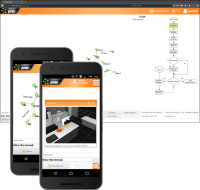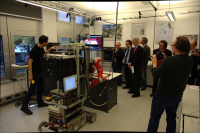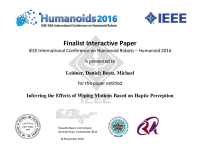Welcome to the Institute for Artificial Intelligence!
The Institute for Artificial Intelligence (IAI) is directed by Prof. Michael Beetz.
As a research institute, we conduct basic scientific research in the field of cognition-enabled robotics for everyday activities.
As part of the Faculty of Computer Science, we run strongly project-based teaching. Our hands-on projects in teaching include SuTuRoProjekt: SUTURO - sudo tidy-up-my-room, IntEL4CoRo and the annual EASE Fall School.
The IAI is member of the Center for Computing and Communication Technologies (TZI) at the University of Bremen as well as the high-profile area Mind, Media and Machines (MMM).
Research
| Funded projetcs | |
|---|---|
 | EASE (SFB 1320) is a collaborative research center for everyday activities. |
 | IntEL4CoRo provides an interactive learning environment. |
 | euROBIN is a European Network of Excellence that the IAI is part of. |
 | REMARO develops a reliable and safe AI system for underwater robotics. |
 | Tracebot enables robotic systems to understand what they do. |
| Internal projects | |
|---|---|
 | CRAM is a software toolbox for the implementation of autonomous robots. |
 | KnowRob is a knowledge processing system for robots. |
 | OpenEASE is a web-based knowledge service providing robot and human activity data. |
 | GISKARD is a framework for constraint- and optimization-based robot motion and planning control. |
 | RoboKudo is a perception framework targeted for robot manipulation tasks. |
A full overview of our ongoing and completed projects can be found here.
News
PRAC is now available on mobile devices too
Probabilistic Action Cores (PRAC) system has a new web interface: PRACWeb which allows users to test out on smart devices the capabilities of the system. PRAC system is the implementation of a novel approach for probabilistic high-performance natural-language interpreter. The interpreter has a knowledge-driven approach. It is inspired by concepts of cognitive psychology and models actions as abstract event types. PRACWeb allows the user to generate robot-executable plans from natural-language instructions. PRAC relies on pracmln, which is a toolbox for statistical relational learning and reasoning. It includes tools for standard graphical models (in particular, MLNs). The web interface of pracmln is WebMLN. It allows the users to try out the capabilities of pracmln system.
Die Bremer Universitäts-Gespräche 2016 lead by Prof. Michael Beetz, PhD and Prof. Dr. Andreas Birk
Since 1988 the annual Bremer Universitäts-Gespräche is organized by the Wolfgang-Ritter-Stiftung, the University of Bremen and the Unifreunde.
“Cognition-enabled Robotics: Democratising a Disruptive Technology” was the theme discussed this year. The event gathered together renowned researchers in the fields of Artificial Intelligence and Robotics.
The reception of the event took place in the laboratory of the Institute for Artificial Intelligence from University of Bremen with live demonstrations on robots and virtual reality and poster session for the other software systems developed here.
The event continued with the talks of the invited researchers. Prof. Dr. Yiannis Aloimonos from The University of Maryland presented an overview of grammar of actions. Digital innovation platforms for robotics were discussed by Prof. David Lane from Heriot Watt University. Prof. Gordon Cheng from Technical University of Munich discussed the robots in the age of innovation. Memory systems for robotic agents was the subject addressed by Prof. Tony Belpaeme from Plymouth University. Prof. Gregory O’Hare, PhD from University College Dublin discussed the autonomous robots and intelligent environments. The robots co-workers were the subject of the talk of Prof. Dr. Alin Albu-Schaeffer from Institute of Robotics and Mechatronics of DLR. Prof. Dr. Markus Vincze from the Technical University of Vienna discussed the available open source libraries for robot perception. The challenges imposed by robot-centred knowledge representation were addressed by Prof. Dr. Herman Bruyninckx from the University of Leuven. Dr.-Ing. Georg von Wichert from Siemens AG and Dr.-Ing. Amos Albert from Bosch Deepfield Robotics were discussing the democratising a disruptive technology.
The discussions were moderated by Prof. Dr.-Ing. Bernd Scholz-Reiter, the rector of the University of Bremen, Prof. Dr.-Ing. Tanja Schultz and Prof. Dr. Rainer Malaka professors at University of Bremen and Prof. Dr.-Ing. Katja Windt, the rector of the Jacobs University Bremen and Prof. Dr. Andreas Birk professor at the Jacobs University Bremen and Dr. Uwe Haass from RoboConsult.
The opening and welcoming of the event were given by Prof. Dr. Eva Quante-Brandt from Minister for Health, Science and Consumer Protection of Bremen respectively Prof. Dr. Helge Bernd von Ahsen from Wolfgang-Ritter-Stiftung.
The entire event was coordinated by Prof. Michael Beetz, PhD from the University of Bremen and Prof. Dr. Andreas Birk from the Jacobs University Bremen.
"Inferring the Effects of Wiping Motions Based on Haptic Perception" Best Paper Finalist at Humanoids 2016
We are very happy to announce that the paper authored by Daniel Leidner from Robotics and Mechatronics Center of DLR and Prof. Michael Beetz, PhD from Institute or Artificial Intelligence was nominated for The Best Interactive Paper Award at Humanoids 2016.
The paper presents how the haptic perception paired with a qualitative effect representation can be used to reason about the task performance of robotic wiping motions despite poor visual information. The proposed approach relates the desired contact force to the measured end-effector force in order to simulate the effect of the previously executed wiping motions. In this way the proposed approach is able to replan recovery motions after it successfully distinguished good from bad contact situations, w. r. t. the desired effect. The proposed approach was evaluated on a set of experiments with the robot Rollin' Justin.
Teaching
A detailed description of most courses can be found in the Online Module Handbook of the FB3: http://apophis.informatik.uni-bremen.de:3001/.
If you are looking for lectures from past semesters, take a look at our Lecture archive.
Beside lectures and projects, we also offer thesis assignments.
Prof. Dr. hc. Michael Beetz PhD
Head of Institute
Contact via
Andrea Cowley
assistant to Prof. Beetz
ai-office@cs.uni-bremen.de
Discover our VRB for innovative and interactive research

Memberships and associations:













